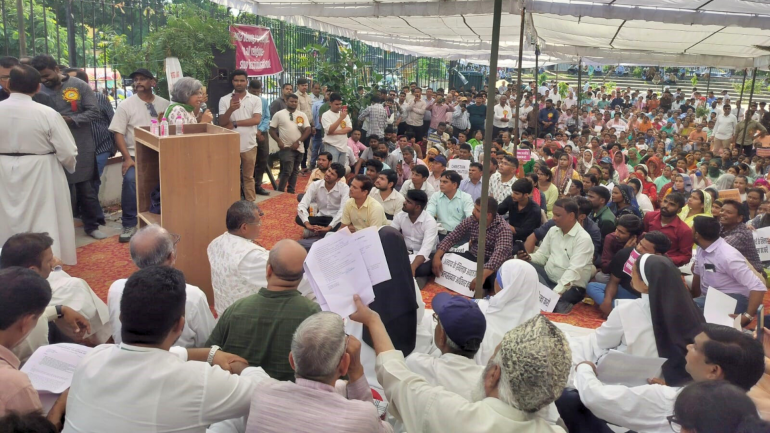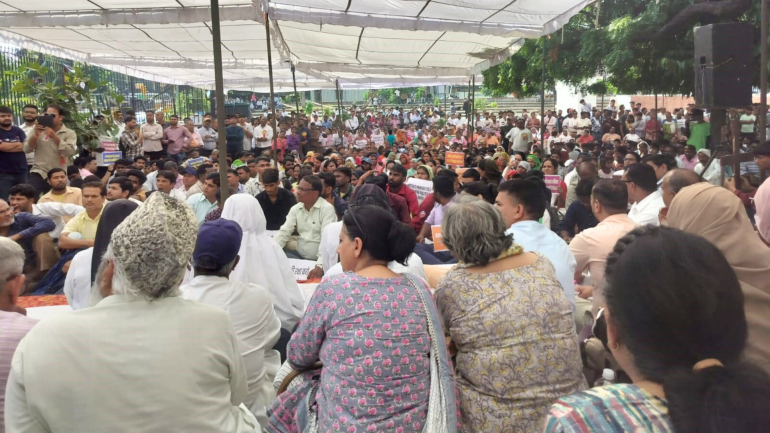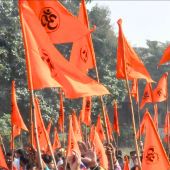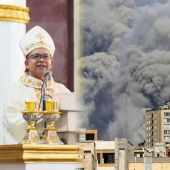Minorities protest against Anti-Conversion Bill in Indian State

Christians, Muslims, and other minorities converged at the Shaheed Smarak (Martyrs’ Memorial) in Jaipur, the capital of the central Indian state of Rajasthan, on October 5, 2025, to protest against the passage of the Rajasthan Religious Conversion Bill, 2025, in the Legislative Assembly on September 9 amid protests by opposition legislators.
This bill replaced a similar version that was introduced in February 2025 and is considered significantly harsher. Earlier, in 2006 and 2008, attempts to pass anti-conversion laws were also made, but these did not receive the necessary approval to become law.
For the bill to become law, it now requires the Governor's assent. The protesters urged Governor Haribhau Bagade not to sign it. They also urged Chief Minister Bhajan Lal Sharma to stop criminalizing prayer meetings and to take action against hate campaigns by groups such as Bajrang Dal targeting Christians. The state is ruled by the Hindutva party, Bharatiya Janata Party (BJP).
The bill prohibits religious conversion through means such as misrepresentation, force, or fraud, placing the burden of proof on the person who caused the conversion to demonstrate its lawfulness. Penalties for unlawful conversion vary based on the circumstances. General conversion can result in 7 to 14 years of imprisonment and a ₹5 lakh fine, while converting vulnerable groups like minors or women carries penalties of 10 to 20 years in prison and a ₹10 lakh fine. Mass conversions are punishable with 20 years to life imprisonment and a ₹25 lakh fine. Receiving foreign funds for conversion activities incurs 10 to 20 years in prison and a ₹20 lakh fine. Organizations involved face license cancellation, property confiscation, frozen accounts, and a ₹1 crore penalty. Properties used for unlawful conversions can also be confiscated or demolished.
Individuals wishing to convert voluntarily must follow a process that includes notifying the District Magistrate (DM) 90 days in advance, while the religious converter must give 60 days’ advance notice. The DM is required to publicly display conversion details, which has raised privacy concerns.
The bill exempts those who convert back to their "ancestral religion," which critics see as benefiting the "ghar wapsi" movement. Marriages performed solely for unlawful conversion will be declared void. The state government argues the bill is needed to prevent forced conversions and protect vulnerable communities from practices like "love jihad."

The protest, organized jointly by the Jaipur Christian Fellowship and the Rajasthan Christian Alliance under the banner of the Coordination Against the Religious Conversion Bill, 2025, witnessed the participation of over 20 organizations.
The gathering unanimously resolved that their state-wide protest would continue until the bill is withdrawn.
Muhammad Nazimuddin, state president of Jamaat-e-Islami Hind, Rajasthan, described the bill as a black law that is unconstitutional and violates the fundamental rights guaranteed by the Constitution. He demanded the repeal of this unconstitutional bill. He also urged the protesters to unanimously raise their voices against the government’s anti-constitutional policies.
The protesters condemned repeated attacks on prayer meetings by Vishwa Hindu Parishad and Bajrang Dal members and criticized the police for registering cases against clergy and devotees instead of protecting them. A call was made for the immediate arrest of such groups and urgent action in FIR number 0783/2025 filed at Pratap Nagar Police Station.
Those who spoke on the occasion included Pastor Vijaypal Singh and Father Edward Oliveira, Vicar General of Jaipur Diocese. Bishop Emeritus Oswald Lewis and representatives from Buddhist and other faith communities were also present. The protest concluded with the singing of the national anthem.
Critics, including opposition parties and human rights activists, contend that such laws can be used to target minorities, criminalize interfaith marriages, and infringe upon constitutional rights to privacy and freedom of religion. According to senior journalist Sunny Sebastian, Rajasthan is the latest of the 13 Indian states to legislate on conversions from one religion to another. It's new legislation, the Rajasthan Prohibition of Unlawful Conversion Bill, which was passed by the state Assembly in September, is considered to be the most stringent among them all, going by the penalties and punishments, including jail terms.
The main target, as everyone knows, is the minuscule Christian community in the state. Muslims are also targeted in the context of “love jihad,” but, surprisingly, the main objective of the present bill appears to be to hit the Christian community, which runs many educational institutions in the state. As if it were a signal, within a month of the passage of the bill, which is still awaiting the Governor’s clearance, there were 13 attacks on Christians in eight districts of Rajasthan.
(Jose Kalathil, a veteran Indian Catholic journalist based in New Delhi, contributes to various magazines and platforms, both in the country and abroad.)
Radio Veritas Asia (RVA), a media platform of the Catholic Church, aims to share Christ. RVA started in 1969 as a continental Catholic radio station to serve Asian countries in their respective local language, thus earning the tag “the Voice of Asian Christianity.” Responding to the emerging context, RVA embraced media platforms to connect with the global Asian audience via its 21 language websites and various social media platforms.














